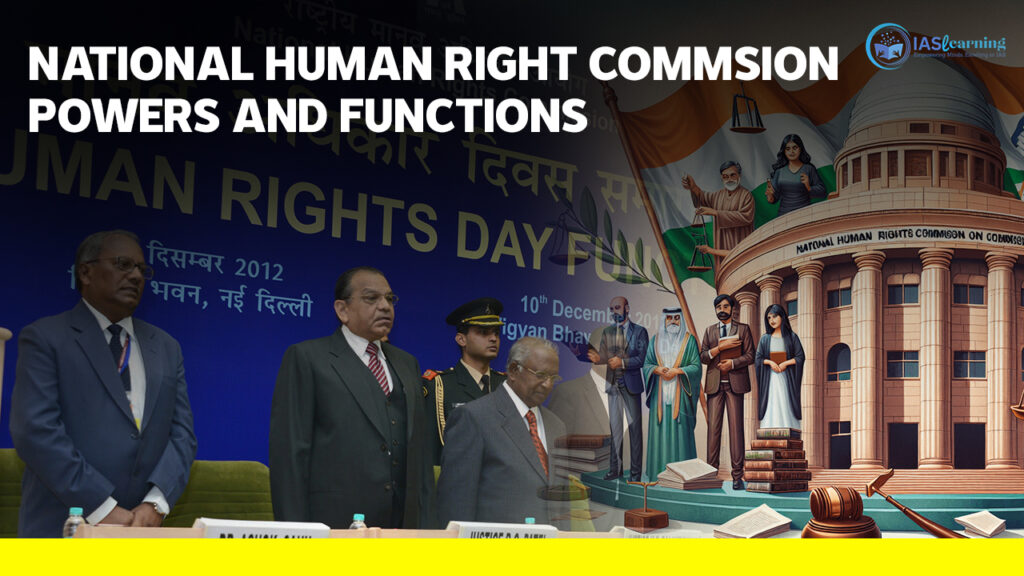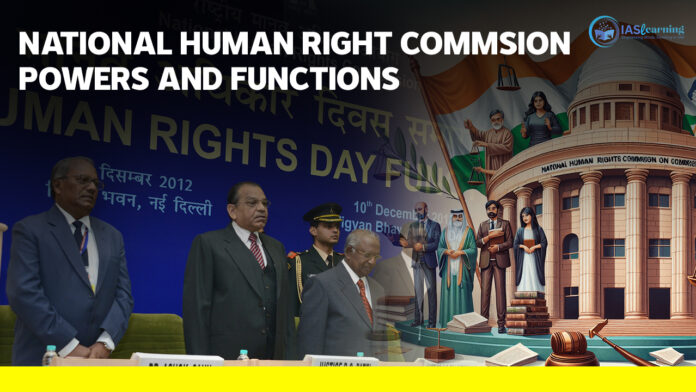National Human Rights Commission (NHRC) of India: Guardian of Rights
What is NHRC?
The National Human Rights Commission (NHRC) is an independent body set up on October 12, 1993, under the Protection of Human Rights Act, 1993. It works to protect the fundamental rights of every individual — the right to life, liberty, equality, and dignity.
NHRC investigates human rights violations and makes recommendations to the government to take corrective action. Think of it as the watchdog of human rights in India.

Human Rights: Meaning Made Simple
As per Section 2(1)(d) of the Act, human rights refer to basic rights such as:
- Right to Life
- Right to Liberty
- Right to Equality
- Right to Dignity
These rights are supported by the Indian Constitution and also backed by global agreements.
Main Goals of NHRC
- Check abuse of power by public officials.
- Investigate violations and suggest ways to fix them.
- Spread awareness about human rights.
- Support NGOs and civil society in their efforts.
Structure of NHRC
Here’s a breakdown of who makes up the NHRC:
Full-Time Members
- Chairperson: Retired Chief Justice of India or SC Judge.
- Other Members: One SC Judge, one HC Chief Justice, and three human rights experts (one must be a woman).
Ex-Officio Members
Includes heads of:
- SC/ST Commission
- Women’s Commission
- Minority Commission
- Backward Classes Commission
- Child Rights Commission
- Disability Commissioner
How Are They Appointed?
The President of India appoints members based on the recommendation of a six-member committee:
- Prime Minister (Chair)
- Speaker of Lok Sabha
- Deputy Chairman of Rajya Sabha
- Leaders of Opposition (LS & RS)
- Union Home Minister
For judges, the Chief Justice of India’s opinion is needed.
Tenure and Service Rules
- Term: 3 years or up to 70 years of age.
- Reappointment: Allowed.
- After Term: Cannot join any government job.
- Salaries: Decided by the Central Government but can’t be changed to their disadvantage later.
When Can They Be Removed?
Grounds for removal include:
- Bankruptcy
- Mental or physical incapacity
- Taking paid jobs elsewhere
- Conviction in criminal cases
- Misconduct (needs SC inquiry and President’s approval)
Key Functions of NHRC
- Investigate violations (suo motu or via complaints)
- Intervene in court cases
- Visit jails, review conditions
- Review laws, suggest changes
- Research and promote awareness
- Advise government on treaties and policies
- Collaborate with NGOs
NHRC & The Armed Forces
Even though NHRC can take up cases against armed forces, it has to rely on the Central Government’s reports. After review, it may recommend action, but can’t enforce it directly.
Annual Reports & Accountability
NHRC submits a yearly report to the Central and State Governments. These reports are then placed before Parliament or State Legislatures, along with an action-taken note.
Powers of NHRC
- Civil court powers: Summoning, collecting evidence, etc.
- Access to documents and officers from government.
- Recommend compensation
- Approach High Courts/Supreme Court
But, it cannot act on violations older than 1 year.
Major Issues Handled by NHRC
- Bonded Labour
- Child Labour
- HIV/AIDS Rights
- Disability Rights
- Custodial Torture, Deaths & Rapes
Challenges Faced by NHRC
- No enforcement powers: Only makes recommendations.
- Delayed appointments: Weakens effectiveness.
- No independent probe power: Relies on police/government.
- Lacks diversity: Few women and minority members.
- Limited funding and staff
- Can’t revisit old complaints (beyond 1 year)
- Seen as passive: Called a “toothless tiger”
- Reactive, not proactive
Way Forward: Solutions to Strengthen NHRC
- Give it enforcement powers
- Allow independent investigations
- Increase budget and autonomy
- Add civil society members
- Timely appointments and gender balance
- Regular training and updates
- Transparent working methods
- Periodic evaluations for accountability
NHRC UPSC PYQs
Question 1) Though the Human Rights Commissions have contributed immensely to the protection of human rights in India, yet they have failed to assert themselves against the mighty and powerful. Analyzing their structural and practical limitations, suggest remedial measures. (UPSC Mains 2021)
Question 2) Multiplicity of various commissions for the vulnerable sections of the society leads to problems of overlapping jurisdiction and duplication of functions- Is it better to merge all commissions into an umbrella Human Rights Commission? Argue your case. (UPSC Mains 2018)
Question 3) National Human Rights Commission (NHRC) in India can be most effective when its tasks are adequately supported by other mechanisms that ensure the accountability of a government. In light of the above observation assess the role of NHRC as an effective complement to the judiciary and other institutions in promoting and protecting human rights standards. (UPSC Mains 2014)
Also Read: Indian Astronauts Set to Soar: Group Captain Shubhanshu Shukla

